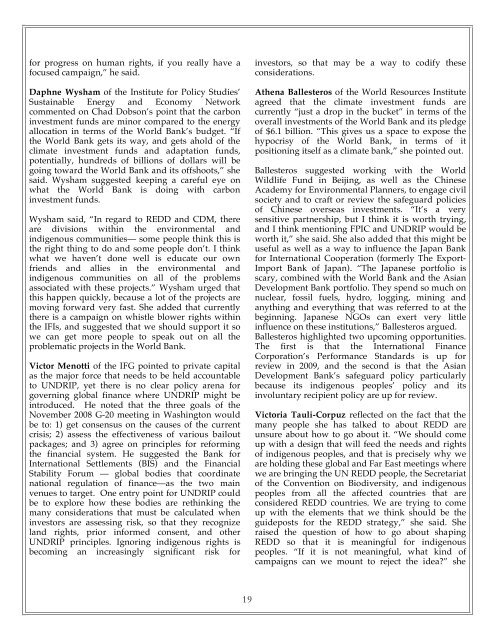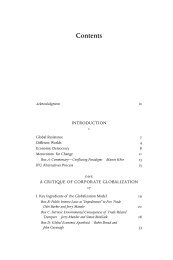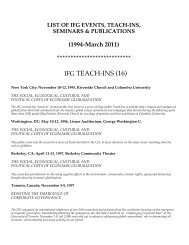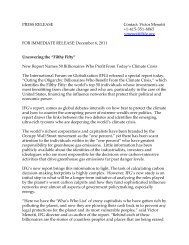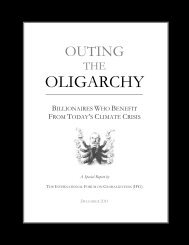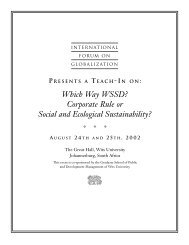UNDRIP Report - English FINAL - International Forum on Globalization
UNDRIP Report - English FINAL - International Forum on Globalization
UNDRIP Report - English FINAL - International Forum on Globalization
Create successful ePaper yourself
Turn your PDF publications into a flip-book with our unique Google optimized e-Paper software.
for progress <strong>on</strong> human rights, if you really have a<br />
focused campaign,” he said.<br />
Daphne Wysham of the Institute for Policy Studies’<br />
Sustainable Energy and Ec<strong>on</strong>omy Network<br />
commented <strong>on</strong> Chad Dobs<strong>on</strong>’s point that the carb<strong>on</strong><br />
investment funds are minor compared to the energy<br />
allocati<strong>on</strong> in terms of the World Bank’s budget. “If<br />
the World Bank gets its way, and gets ahold of the<br />
climate investment funds and adaptati<strong>on</strong> funds,<br />
potentially, hundreds of billi<strong>on</strong>s of dollars will be<br />
going toward the World Bank and its offshoots,” she<br />
said. Wysham suggested keeping a careful eye <strong>on</strong><br />
what the World Bank is doing with carb<strong>on</strong><br />
investment funds.<br />
Wysham said, “In regard to REDD and CDM, there<br />
are divisi<strong>on</strong>s within the envir<strong>on</strong>mental and<br />
indigenous communities— some people think this is<br />
the right thing to do and some people d<strong>on</strong>’t. I think<br />
what we haven’t d<strong>on</strong>e well is educate our own<br />
friends and allies in the envir<strong>on</strong>mental and<br />
indigenous communities <strong>on</strong> all of the problems<br />
associated with these projects.” Wysham urged that<br />
this happen quickly, because a lot of the projects are<br />
moving forward very fast. She added that currently<br />
there is a campaign <strong>on</strong> whistle blower rights within<br />
the IFIs, and suggested that we should support it so<br />
we can get more people to speak out <strong>on</strong> all the<br />
problematic projects in the World Bank.<br />
Victor Menotti of the IFG pointed to private capital<br />
as the major force that needs to be held accountable<br />
to <str<strong>on</strong>g>UNDRIP</str<strong>on</strong>g>, yet there is no clear policy arena for<br />
governing global finance where <str<strong>on</strong>g>UNDRIP</str<strong>on</strong>g> might be<br />
introduced. He noted that the three goals of the<br />
November 2008 G-20 meeting in Washingt<strong>on</strong> would<br />
be to: 1) get c<strong>on</strong>sensus <strong>on</strong> the causes of the current<br />
crisis; 2) assess the effectiveness of various bailout<br />
packages; and 3) agree <strong>on</strong> principles for reforming<br />
the financial system. He suggested the Bank for<br />
<str<strong>on</strong>g>Internati<strong>on</strong>al</str<strong>on</strong>g> Settlements (BIS) and the Financial<br />
Stability <str<strong>on</strong>g>Forum</str<strong>on</strong>g> — global bodies that coordinate<br />
nati<strong>on</strong>al regulati<strong>on</strong> of finance—as the two main<br />
venues to target. One entry point for <str<strong>on</strong>g>UNDRIP</str<strong>on</strong>g> could<br />
be to explore how these bodies are rethinking the<br />
many c<strong>on</strong>siderati<strong>on</strong>s that must be calculated when<br />
investors are assessing risk, so that they recognize<br />
land rights, prior informed c<strong>on</strong>sent, and other<br />
<str<strong>on</strong>g>UNDRIP</str<strong>on</strong>g> principles. Ignoring indigenous rights is<br />
becoming an increasingly significant risk for<br />
investors, so that may be a way to codify these<br />
c<strong>on</strong>siderati<strong>on</strong>s.<br />
Athena Ballesteros of the World Resources Institute<br />
agreed that the climate investment funds are<br />
currently “just a drop in the bucket” in terms of the<br />
overall investments of the World Bank and its pledge<br />
of $6.1 billi<strong>on</strong>. “This gives us a space to expose the<br />
hypocrisy of the World Bank, in terms of it<br />
positi<strong>on</strong>ing itself as a climate bank,” she pointed out.<br />
Ballesteros suggested working with the World<br />
Wildlife Fund in Beijing, as well as the Chinese<br />
Academy for Envir<strong>on</strong>mental Planners, to engage civil<br />
society and to craft or review the safeguard policies<br />
of Chinese overseas investments. “It’s a very<br />
sensitive partnership, but I think it is worth trying,<br />
and I think menti<strong>on</strong>ing FPIC and <str<strong>on</strong>g>UNDRIP</str<strong>on</strong>g> would be<br />
worth it,” she said. She also added that this might be<br />
useful as well as a way to influence the Japan Bank<br />
for <str<strong>on</strong>g>Internati<strong>on</strong>al</str<strong>on</strong>g> Cooperati<strong>on</strong> (formerly The Export-<br />
Import Bank of Japan). “The Japanese portfolio is<br />
scary, combined with the World Bank and the Asian<br />
Development Bank portfolio. They spend so much <strong>on</strong><br />
nuclear, fossil fuels, hydro, logging, mining and<br />
anything and everything that was referred to at the<br />
beginning. Japanese NGOs can exert very little<br />
influence <strong>on</strong> these instituti<strong>on</strong>s,” Ballesteros argued.<br />
Ballesteros highlighted two upcoming opportunities.<br />
The first is that the <str<strong>on</strong>g>Internati<strong>on</strong>al</str<strong>on</strong>g> Finance<br />
Corporati<strong>on</strong>’s Performance Standards is up for<br />
review in 2009, and the sec<strong>on</strong>d is that the Asian<br />
Development Bank’s safeguard policy particularly<br />
because its indigenous peoples’ policy and its<br />
involuntary recipient policy are up for review.<br />
Victoria Tauli-Corpuz reflected <strong>on</strong> the fact that the<br />
many people she has talked to about REDD are<br />
unsure about how to go about it. “We should come<br />
up with a design that will feed the needs and rights<br />
of indigenous peoples, and that is precisely why we<br />
are holding these global and Far East meetings where<br />
we are bringing the UN REDD people, the Secretariat<br />
of the C<strong>on</strong>venti<strong>on</strong> <strong>on</strong> Biodiversity, and indigenous<br />
peoples from all the affected countries that are<br />
c<strong>on</strong>sidered REDD countries. We are trying to come<br />
up with the elements that we think should be the<br />
guideposts for the REDD strategy,” she said. She<br />
raised the questi<strong>on</strong> of how to go about shaping<br />
REDD so that it is meaningful for indigenous<br />
peoples. “If it is not meaningful, what kind of<br />
campaigns can we mount to reject the idea?” she<br />
19


